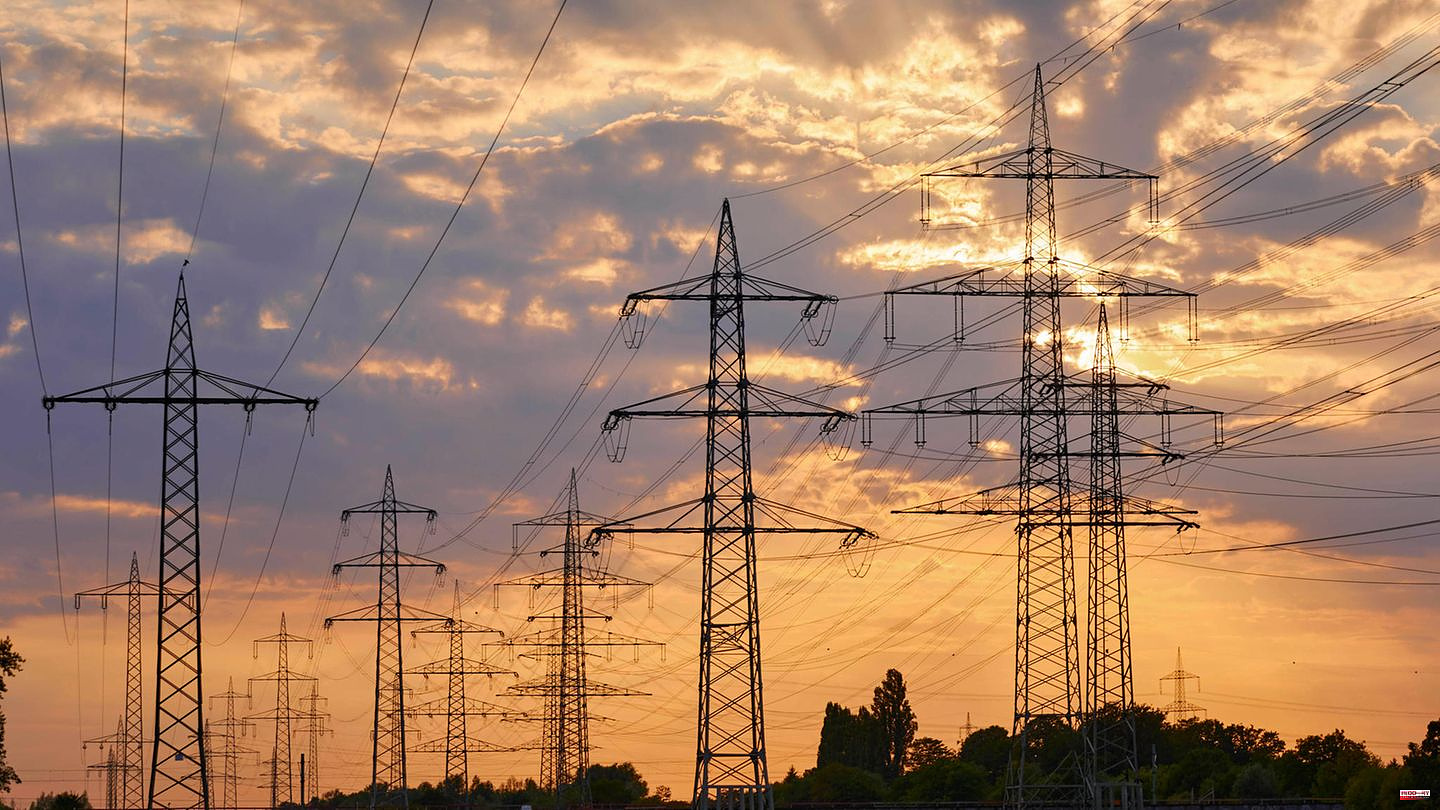One euro per kilowatt hour: This is the level at which electricity prices rose in Germany last Friday. The exchange-traded benchmark electricity prices for the next year are breaking new records almost every day. The federal government is alarmed and is examining how the increase can be curbed. All of Europe is in a "parallel" crisis, a government spokesman said. Astronomically high gas prices are driving electricity costs to unprecedented levels. “A real storm was brewing on the electricity market,” says Simon Müller, Germany director of the Agora Energiewende think tank. Capital answers the most important questions about the electricity price explosion:
On the electricity exchange, a number of causes are intertwined. Across Europe, less electricity is being produced than usual because the huge drought in all of southern Europe – in Italy, in Spain, in France – is causing less hydropower to be generated. At the same time, French nuclear power plants are in crisis: almost half of the nuclear power plants are currently not operational - often also because the water for cooling the reactors is too warm or not available at all. In addition, there are lengthy maintenance and safety problems due to corrosion cracks.
As a result, Germany is supplying more electricity abroad in these weeks. In addition to France also in Switzerland, where less electricity is generated from hydropower due to the drought. Normally, French nuclear power is used to fill gaps in the German market, but now it's the other way around: German electricity has to fill the gaps elsewhere. So it is that this summer, despite the gas crisis, significantly more gas is burned to produce electricity than is actually necessary. In addition, the phase-out of coal and nuclear power in Germany has throttled power plant capacities. All of these reasons add up: In order to cover the needs of households and companies, gas-fired power plants have to be running this summer as well - this is driving up prices dramatically.
The price is based on the so-called marginal cost principle, also known as the merit order principle. Power plants sell electricity on the wholesale market to suppliers who supply end customers. New prices are formed every quarter of an hour. The energy economist Lion Hirth from the Hertie School of Governance in Berlin draws a parallel with agriculture: If a traditional farm produces wheat at a cost of 200 euros per tonne, while a large farm produces wheat at only 50 euros per tonne, both would end up having the highest cost Bring in the price that the market gives - i.e. the price that the customer is willing to pay. The expensive farm wants to sell above its cost price, but the cheaper farm is happy to take the high price with it when wheat is changing hands at 200 euros.
The situation is similar on the electricity market: High gas prices automatically pull the electricity price level up. If gas power plants are needed that cost 800 euros per megawatt hour, they set the price. In July, the gas-fired power plants generated 4036 gigawatt hours of electricity - 13.5 percent more than in the same month last year, according to the Federal Network Agency's Smard electricity market data portal. And their price then applies to every kilowatt hour of electricity produced, regardless of how it was generated. In the market economy, the prices of uniform products such as milk, oil, copper or solar cells also follow such a system.
The fact that the federal government is now examining how the prices of electricity and gas can be "decoupled" is described by many as misleading. If the price of electricity is being held hostage so drastically by the high gas prices, it is said that this is a result of the scarce supply and not a malfunction of the market. "We don't have enough energy," says Lion Hirth. It is a market supply crisis. And in order to solve them, more energy must be provided and less consumed. This imbalance cannot be regulated away, he concludes.
Demands for a decoupling of prices, for example from wind, solar or hydropower from record high gas prices, are meanwhile also being supported by Brussels and countries such as Spain, Italy and Austria. They want a separation into parallel markets.
This decoupling on the German electricity markets puzzles even energy economists. At the end of last week, the price of electricity rose by more than half the cost of gas-fired power plants. "As power futures rise above generation costs, markets are suggesting we will see periods when generation capacity is tight," Hirth attempted to explain. With such expectations, spot prices would rise to extreme levels until demand collapsed.
According to Agora Energiewende, electricity prices on the futures market have increased tenfold compared to the previous year. "Hopefully this should be the end of the road," forecasts Simon Müller. "But of course you can't say that for sure." However, it also seems questionable whether the price will fall again. Experts predict two difficult winters. On the one hand, it will take a while before the gas volumes throttled by Russia can be replaced. This dependency must be eliminated. At the same time, the electricity market is becoming dependent on the weather - in which, for example, the low water level in the Rhine also drives up the cost of coal because the ships can load less and have to sail more often - which in turn will limit the possible electricity production. In addition, there has been a fairly pronounced lull in the wind in recent weeks, which has also caused prices to rise.
The price for one megawatt hour of electricity for delivery in the coming year has recently fluctuated around the 1000 euro mark. The long-term average was between 35 and 55 euros per megawatt hour. Utilities can, to a certain extent, even out such price spikes. According to the comparison portal Verivox, the electricity costs for a three-person household with an annual consumption of 4,000 kWh are currently on average nationwide at 1,832 euros. Compared to the previous year, this is an increase of around 51 percent. The average price is almost 46 cents per kilowatt hour for a three-person household. In view of the constantly new records on the electricity exchange - without network charges, electricity tax, other levies and VAT - Verivox assumes "further price increases for households".
Most experts advise against regulating the market. “We have no problem with the electricity market. In principle, it works great,” says Hirth, for example, and recommends targeted relief for consumers. Since some power plant operators, including coal, nuclear, solar or wind, are paid as if they had bought expensive gas, large profits accrue. Skimming off the additional profits and distributing them to those in need is now popular with many economists. Marcel Fratzscher, President of DIW Berlin, calls for an excess profit tax combined with targeted energy money - this is "the only viable way to limit the damage of the crisis". There is a dispute about how the money can be returned to consumers.
The Federal Ministry of Economics does not really want to change the principle that expensive gas-fired power plants determine the price on the electricity market. In any case, this requires a European solution, it says. However, the aim is to cushion the associated problematic effects for electricity customers and to pass on the "excessive profits" or free-rider effects resulting from the dominance of gas prices to end customers. In this way, relief is to be achieved without using public funds – but exactly how this is to be done is an open question.
Utilities cover a large part of their needs through long-term purchase contracts – on different terms. Regional competition between electricity providers is one reason for the different prices. In some cases, however, they also differ greatly because the network charges as well as taxes and levies are relevant. The grid fees, which account for a quarter of the electricity price in normal times, are also a reason why electricity in southern and western Germany is usually cheaper than in northern and eastern Germany. A levy on municipalities, for example for the laying of cables in public spaces, also varies the amount of the basic price.
The exceptional situation on the gas and electricity market has existed since autumn 2021, and procurement prices have been very high since then and continue to rise. Many energy providers have responded with price increases, while others no longer offer special tariffs for new customers. As a result, the range of available tariffs is lower than before the gas price crisis. The consumer center points out that in some cities the basic service tariff is currently the cheapest tariff. However, the savings when switching providers are small in many regions. "It is usually difficult to find attractive tariffs," says the consumer advice center. In order to compare conditions and term commitments, it is recommended to read the fine print step by step.
This article first appeared on capital.de







